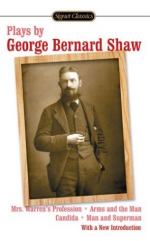|
This section contains 2,983 words (approx. 10 pages at 300 words per page) |

|
SOURCE: Adams, Elsie B. “Heartless, Heartbroken, and Heartfelt: A Recurrent Theme in the Plays of Bernard Shaw.” English Literature in Translation 25, no. 1 (1982): 4-9.
In the following essay, Adams considers the significance of Shaw's repeated use of “heart” in compound words and phrases throughout his plays, and the association of these terms with particular characters.
It has been a critical cliché of long standing that Shaw is a writer of intellect, not passion—appealing to the brain and not to the heart. Shaw was of course aware of this critical opinion, and objected to it as an oversimplification of his matter and method. For example, in his satire on drama critics in the Epilogue to Fanny's First Play (1911), he has the appropriately named Bannal offer the opinion that Shaw is “Intellect without emotion.” In trying to guess the anonymous author of Fanny's First Play, the critics reject the notion...
|
This section contains 2,983 words (approx. 10 pages at 300 words per page) |

|


